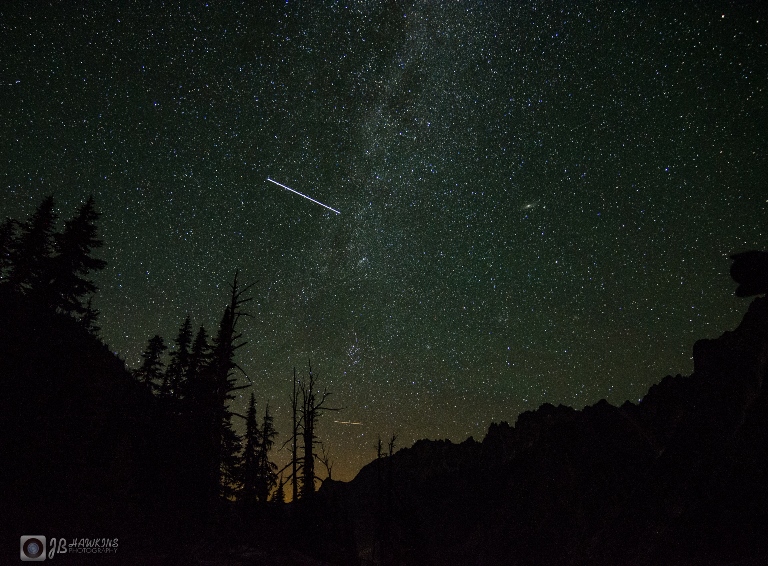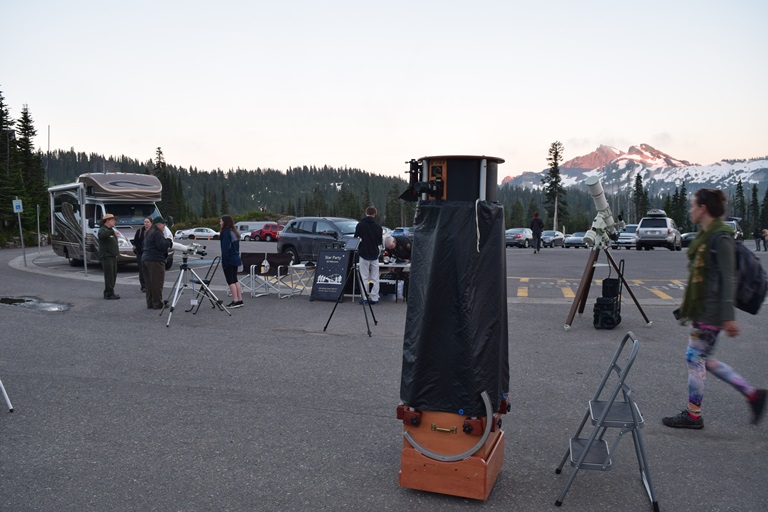Where to View Perseids Near North Bend Oregon
Editor's note: Most star parties and organized public viewing events described in this article remain suspended for 2021, but a few are happening and you can still try to catch a glimpse of the Perseids with your fam. Good luck!
One summer while camping at Mount Rainier National Park, my two children and I went up to Paradise to catch the sunset and look at the stars. We were pleasantly surprised to find park rangers and volunteers setting up for an evening of stargazing with telescopes. We hung around until almost midnight, taking turns with other park visitors looking through large telescopes at distant stars, planets and even other galaxies. My kids were entranced.
A star party at Mount Rainier is just one of the stellar opportunities around Puget Sound to learn about the night sky during the summer. And one of the peak stargazing events of the year is approaching: The Perseid meteor showers, which you can view from Puget Sound urban areas, will peak Aug. 11–13, 2021. The Perseids produce the most star trails after midnight.
The Perseids happen when the earth travels through the debris of Comet Swift-Tuttle. Families can also enjoy watching for the International Space Station as it passes overhead. And the aurora borealis sometimes makes an appearance — keep track on spaceweather.com for possible magnetic storms.
Stargazing in the city
Dark and cloudless skies are required for stargazing, which makes Seattle and other urban areas less than ideal. But for families just starting out, there are still some urban spots dark enough to lay your blanket out and see the night sky.
Alice Enevoldsen, a local expert on astronomy and education, recommends several different sites in the city for urban stargazing, including Myrtle Reservoir, Lincoln Park and Solstice Park in West Seattle.
Green Lake is also a popular stargazing site, as it is one of the few city parks open after 11:30 p.m. The Seattle Astronomical Society periodically hosts star parties at Green Lake, as well as at Paramount School Park in Shoreline, weather permitting. Members of the Society bring telescopes for the general public to use, and enjoy sharing astronomical facts with people of all ages.
In the South Sound, the Tacoma Astronomical Society also hosts star parties for the public at Pierce College. Battle Point Astronomical Association has public star parties and indoor planetarium shows on Bainbridge Island. If you're headed to the Tri-Cities, the Tri-City Astronomy Club hosts public star parties from March through October.
Brie Hawkins, a local weather enthusiast and photographer, recommends Lighthouse Park in Mukilteo for urban stargazing. Some of her favorite spots away from the city include the Diablo Lake and Washington Pass overlooks along Highway 20 in the North Cascades. These places are open at night and have toilets available. You can find camping at Newhalem or Colonial Creek near Diablo Lake or Lone Fir, Klipchuck or Early Winters campgrounds near Washington Pass. [Editor's note: This area is experiencing wildfires and may be inaccessible.]
A quick, accessible spot outside the city but not far, especially from Eastside locales, is Rattlesnake Lake in North Bend (park outside the gate so your car doesn't get locked inside after they close).

Starry camping and backpacking
Getting further away from the city, of course, will earn you more Perseids action. One of Enevoldsen's favorite spots is the boat dock at Lake Kachess along I-90, and Staircase Campground in Olympic National Park. (If you're not staying overnight at the campground, talk to the ranger to get permission to be there.)
For families who are looking for more adventure, consider attending an event at one of our national parks or monuments. The Olympia Astronomical Society (OAS) occasionally hosts star parties and night hikes at Hurricane Ridge. Check the OAS website for future events.

Paradise on Mount Rainier hosts summer sky gazing events and some daytime solar viewing. The Mount St. Helens Institute sponsors star parties on occasion.
Families who enjoy backpacking will find even more places to be away from city lights. Child-friendly backpacking trips with open skies include Shadow Lake at Mount Rainier and Lake Ann in the North Cascades.
Other popular camping and photography areas include Tipsoo Lake near Mount Rainier, Slate Peak out of Mazama, Salmon La Sac and the surrounding camping areas and Sun Lakes – Dry Falls State Park in Central Washington.
Stargazing gear and tips
- Find a place with a dark, open sky
- Turn off lights and electronic devices
- Let your eyes adjust to the dark for at least 10–15 minutes
- Binoculars can work for some planets and the moon
- Bring reclining lawn chairs, and blankets and coats
- Bring a paper star finder
- Use apps such as SkyView Free
- If you must use a light, put a red filter over your flashlight
- Check clearskycharts.com
More stargazing spots and resources for curious families
- Alice's Astro Info
- Seattle Astronomical Society, with monthly public star parties
- The University of Washington Planetarium
- Pacific Science Center Planetarium (temporarily closed)
- Tacoma Astronomical Society: Public nights at Pierce College, including indoor demonstrations, lectures, and workshops, as well as telescopes for viewing when weather permits
- Bellevue College Astronomy Department Planetarium: Shows for school children and public shows on some Saturdays
- Battle Point Astronomical Association Planetarium and stargazing with members of the club on Bainbridge Island
- Goldendale Observatory: This observatory, located in Goldendale State Park. Public programs in the afternoons and evenings, including special programs for important celestial events.
- The Jewett Observatory at Washington State University has public viewing parties about once a month on Saturday evenings
- Read the Washington Trails Association article on dark-sky backpacking trips.
Editor's note: This article was originally published several years ago and updated most recently for 2021.
Where to View Perseids Near North Bend Oregon
Source: https://www.parentmap.com/article/where-see-perseids-meteor-shower-around-puget-sound
0 Response to "Where to View Perseids Near North Bend Oregon"
Post a Comment